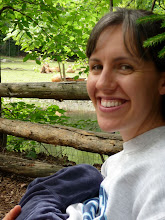I sighed in amused exasperation, told myself Oh-well-I-tried, and then settled down, perfectly happy, on the sofa. I only got happier.
We've all had the experience of reading a book that we had long known solely as a movie, and most of us know the outcome: We find the book always, always to be better. Sometimes, as happened to me with Gone with the Wind and Pride and Prejudice, we can acknowledge that although the book is better, the movie is still pretty darn good, and there's room for everyone at the table. Other times, we discover that the movie did the book such a gross disservice that it really shouldn't even exist--or it should at least have a different title. That happened to me when I finally read Mansfield Park. And Mary Poppins.
If you adore the silver-screen musical and can't wait to get tickets to the Broadway version (or perhaps you've already gone and seen it), be warned. Reading the book will probably change your perception of these forever. You'll never be able to see the movie again without noticing just how much is missing. It's a comparatively slim book, so you wouldn't expect it to contain so much more than a full-length film, but it does.
Sure, the movie shows Mary jumping in and out of pictures and visiting Uncle Alfred on the ceiling, but how could the film-makers have left out the compass that takes Mary and the kids to the four corners of the world, the baker lady who has Mary steal her young charges' paper stars so she and Mary can climb a pair of ladders to glue them onto the night sky? And what about the tale Mary tells of the cow who couldn't stop dancing because a fallen star had gotten caught on her horn, or the chapter in which Jane and Michael's baby twin siblings talk to Mary, the sunlight, the wind, and a starling one quiet afternoon in the nursery? Come to think about it, what about the existence of those twin babies in the first place?
I actually found Mary herself more interesting and likable in the book. She's vain and conceited, but she has magic, everybody knows her and admires her, and she wants to show the children a good time, even though she'd never admit it. I think the Julie Andrews version comes across as too soft and gentle, so that in the moments when she needs to be harsh, it just seems jarring. In the book, it's funny because the quips and attitude are consistent. Mary is like the nineteenth-century British nanny version of House. (Well, not exactly like that, but inasmuch as they are both unrelentingly gruff, fascinating, and gosh-darn-it, kind of lovable.)
This book made me laugh out loud several times. I'm down to the last chapter and don't want it to end. Luckily, I found out, by reading the author's bio, that it's part of a series. I also found out that the author, P.L. Travers, shared a birthday with Isaiah. I plan to use that as an icebreaker when I seek her out in heaven, and then I'll beg her to tell me a story.

No comments:
Post a Comment